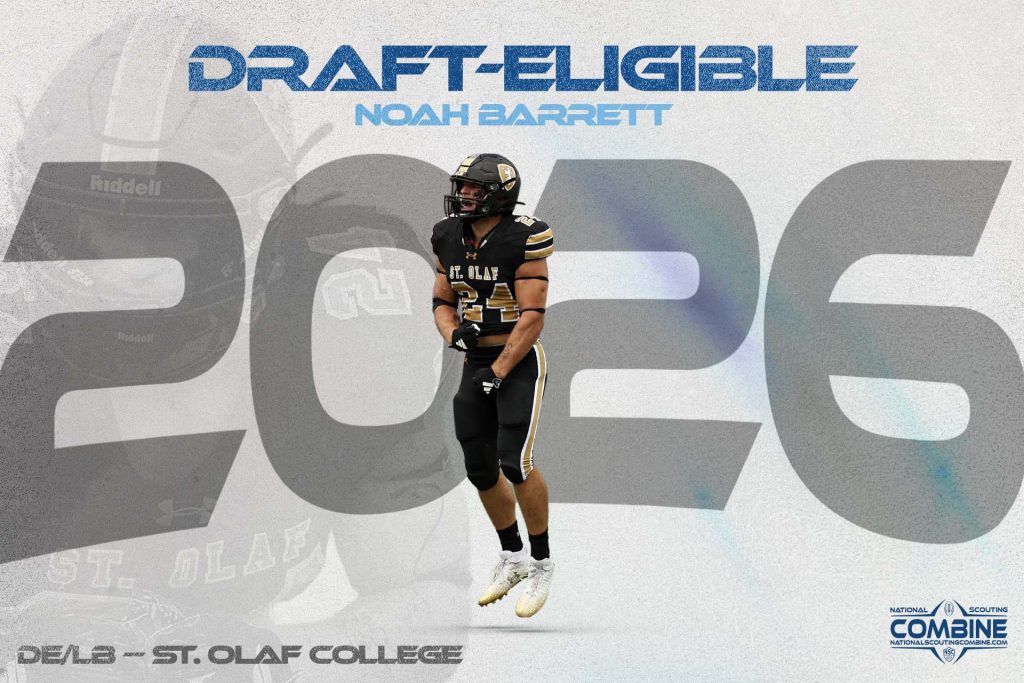
Noah Barrett
Position: Defensive End/Linebacker | School: St. Olaf College
X: @NoahBarrett24
Instagram: n_barrett24
Collegiate Career
– What advice do you have for current high school athletes who hope to make it to the next level?
Just work hard consistently. Effort beats talent especially when effort is consistent. Show up and do the work every day and be intentional about the work you’re doing to get better. And do the extra, everything you do reflects how bad you truly want to achieve something.
– How’d you end up at your current school? What was the recruiting process like?
I had a lot of options across all divisions and my ultimate goal was to go D1 but I found St. Olaf was the best for me being able to provide me with everything that was important to me regarding academics and resources, football, faith, and community allowing me to grow as a full individual instead of just a football player.
– What do you consider to be one of the more important things you learned from the coaching staff?
We talk about a lot of culture stuff at Olaf and some of the things that resonate with me specifically are, “Opportunities lost are never regained”, “What you do some of the time is what you do all the time”, “Trust is hard to earn but easy to lose”, and “Press pause to gain clarity”. All of these we wrap into football but also life in general and I appreciate these lessons on and off the field.
– What would you consider to be your biggest accomplishment in your sports career so far?
I would say being voted captain as a junior defensive end with having 22 seniors ahead of me, especially a lot of offensive guys. I feel like that’s a big testament to my leadership. I am also proud of my All conference and region selections after my junior year but ready to pursue my ultimate goal of being an All American in my senior season.
– What is your Major and what do you hope to accomplish in your post athletic career?
I am majoring in Kinesiology pursuing sports performance while also having concentrations in Management & Family studies. The management track is helping me prepare for managerial roles as well as entrepreneurship endeavors as my ultimate goal is owning my own sports performance facility someday. The family studies plays a role in understanding psychology of humans especially humans interacting in tight knit groups with others. I feel my major and concentrations have helped me be fully equipped with what I need to be successful with my ultimate career goals.
Performance & Training
– Can you walk us through a typical training day during the season and off-season?
During the season, I like to break my day up to allow focus on the things I need to be locked into as far as school, football, and taking care of my body and being intentional to the moment while doing these tasks. I usually keep my classes in the morning before having treatment and lunch. We lift 2 days a week in season which is usually at 6am. We then have practice from around 3-6pm followed by dinner and whatever else I need to do for school/football as well as taking time to relax or do things for my body to get right for the next day.
Off season is a little more ramped up. I still focus my time on classes/homework with having more time to spend on that without having practice/meetings so I usually take my harder classes in the spring if I can. I also try to continue to watch film or YouTube videos to keep my football IQ growing. We have a lift and run each day as well as a team, again usually in the morning. I tend to do some extra work on my own/with whoever wants to join me on things I need to specifically improve on to keep me ready for the next season to play at the highest level I can. We also have access to a dome so we do position work 2-3 times a week. Outside of that is really just enjoying my free time and relaxing when I can.
– How do you mentally prepare for high-stakes games or competitions?
My mental preparation comes long before high stakes games show up on the schedule. The summer heading into my junior season, I took some sports psychology classes and lessons which have helped me tremendously ever since. I do mentality/confidence lessons all offseason with different themes/focuses depending on that point of the offseason. I continue these into the season as well pointing to my mistakes as empowering lessons, recognizing and praising my strengths, and manifesting my goals. These habits keep me confident and sharp with my abilities with constant improvement so whenever the lights are the brightest I’m the most confident.
– What’s the biggest challenge you’ve faced in your athletic career, and how did you overcome it?
Following my freshman season, which was exciting since I played a good amount, I was anticipating stepping into a potentially bigger role that thrilled me. That offseason after discussing with my coaches they wanted me to gain 30 pounds and see how I could play at that weight. I accepted that, put on the weight, and still anticipated a significant role on the team. However, I did not play as well at that weight, got placed in a new position behind a senior, and got hurt so I played a lot less than I thought. During this time I was very disappointed; while still giving it my all every day the season quickly came to an end and I feel I didn’t leave an impact like I thought I could. After the season instead of dwelling on my circumstances, I quickly changed things. I changed my body composition and lost bad weight, got my body healthy, and stepped into a bigger role, which ended up being a captain, starter, and All conference and All Region selections just one season later. I was able to preserve and work for different results rather than being upset and hoping things would change, I showed up everyday and made them change which turned around my career trajectory when a lot of people, including myself at times, counted myself out after my sophomore season.
– How do you stay motivated during times when you’re not performing at your best?
Just reminding myself of my strengths and goals and seeing my mistakes not as a negative thing but an opportunity to learn and grow. If I feel like I’m in a rut with mistakes, I literally watch my highlights or go out and do what I need to on the field and show myself that I can and have done these things to succeed to keep my confidence up and take it one day and play at a time to also eliminate the negative rut from happening.
Team Dynamics & Leadership
– How has being part of a team shaped your personal growth or leadership style?
Being part of a team, especially in the collegiate world has shown me how the real world works. It has shown me that there is a standard every day that you need to show up and embark on while not only pushing yourself but others around you. It has helped me grow individually, encouraging me to step into a leadership role by giving it my all and letting that be contagious and encouraging no matter what I’m doing, always giving my best and helping others lean towards their best. It has also helped me as a leader realize how to utilize different leadership styles. Being on a team of 100, it has shown me not everyone reacts the same way to certain leadership styles. With that, you really just have to learn your teammates and what you can do to get the most out of them while still being positive and enforcing confidence but also holding them accountable. Doing it this way also helps you get to know your teammates better which builds tighter relationships and ultimately stronger trust.
– Can you describe a moment when you had to step up as a leader, either on or off the field?
I feel I am a natural born leader and always have been whether it was my first year playing in 3rd grade, at recess, or leading the line in elementary school. I’ve carried that all throughout my life and embraced that early on in college. I was voted onto the leadership council as a sophomore and captain a year later. The biggest challenge I’ve had as a leader where I had to step up however was going into my senior year. I had to step up here because, being the senior now, I had no other older guys around me to help lead. It was extra challenging because we had more underclassmen than returners/seniors going into the offseason which was unusual. I had to step up when directing the young guys through the offseason, a lot going through it for the first time, and pushing that standard every day to get the best out of myself and my teammates. It was hard for me to not assume they knew what they were doing because they haven’t done it before, so I had to lead in every facet every day all offseason when I haven’t had to before so this was a time I had to step up the most in my career so far.
– What qualities do you think make a great teammate?
We talk about this in our program quite a bit. We describe this as doing the things you say you’re going to do, being trustworthy, being a leader, and giving it your all for the guy next to you. We highlight the importance that trust is easy to lose but hard to gain. Trust between teammates and coaches is super important to be able to play together and everyone has to be doing their one eleventh. Making sure your daily actions reflect the standard of the team and holding others accountable to do so. Being able to do all that while also getting to know your teammates on a personal level is what rounds it all out.
Collegiate Transition
– What was the biggest adjustment moving from high school to college athletics?
Everything is faster. The game and players are all faster. Classes and your schedule move faster. It just was a completely different pace than I experienced in high school and there’s a lot less free time. I think the advancement in speed definitely helps grow you as you prepare for life after college as well.
– How do you balance academics with the demands of being a high-level athlete?
For me, I need to have things planned out and organized so being able to utilize to do lists and google calendar are huge for me. Google calendar is more for laying out my schedule by semester and keeping me on a routine as I look ahead for the week/month as well as being able to anticipate bigger assignments such as quiz’s/tests/papers/projects/etc. I like having a to do list for things specifically for the week and being able to check them off as the week goes on help me stay motivated and feel accomplished. The last piece is being intentional where my feet are. If I’m in class, I’m 100% engaged in class. If I’m at practice, I’m 100% committed to that practice. I think this also allows me to keep a clear head and focus on what’s in front of me and knowing when it’s time for certain things so I don’t let my mind wander to other things and stress myself out to avoid feeling scrambled.
– What was an important lesson you learned early on that has impacted your success?
I think just sitting back and watching how the older guys did things my freshman year. Being able to see the standard and implement that to how I act immediately. I was blessed with having a lot of good leaders early on in my career and that helped shape me into the player and leader I am today. Understanding early as a player the importance of doing the things expected of you and doing them with 100% effort while doing it the right way, you will be noticed and the coaches will have a hard time keeping you off the field.
Off-the-Field Life & Mindset
– How do you handle pressure from fans, media, or expectations around performance?
Anytime I encounter these situations I approach it with humbleness. Being at a smaller school, the pressure of all this isn’t too great compared to higher levels. A lot of interactions I have with this is with classmates or staff on campus which I feel helps build relationships and keeps us tight knit as a college community so I like that we all support each other.
– What role does mental health play in your life as an athlete, and how do you maintain it?
It plays an important role. Being able to keep your mind organized but also clear to manage emotions and mindset is very important. I have taken sports psychology classes and being able to understand the response your body and mind are having to certain situations is super important so you can continue to improve and build your confidence no matter what part of the season you’re in as an athlete. I maintain it by learning as much as I can about it and being able to be in check with my emotions and thoughts to be in as best of a place mentally I can be.
– What’s something people might misunderstand about what it takes to compete at your level?
It is very competitive and talented. There’s still a ton of people who can play at a very high level. Everyone who plays and has been developed in the college program is fast, strong, and talented. The competition is at a very high level, especially the conference I play in being the MIAC. There’s always nationally ranked teams and teams that can play with anyone in the nation. I think it is a huge misconception that DIII is not good or competitive.
– If you could make a positive impact on all of society, what would it be and why?
I think just being able to give and spread kindness. When I am in my career wherever I end up, I want to be able to give back around holidays. For example, doing things such as, food drives for Thanksgiving, toy drives for Christmas, supporting local businesses, and giving back to the less fortunate is something I’ve always wanted to do to try to spread positivity and make the world a better, happier place.
– How would you describe your work ethic?
Truly believe I’m the hardest worker I know. I have an incredibly high standard for myself and have great self-discipline to get the things I need to do and do it 100% to improve daily. I figure out what I need to do, do it to my absolute all, and find extra things I can do as well. I am very organized and maximize every minute of my day and try to squeeze in any small deposit I can do daily to help build skill over time. I do a very good job of keeping myself motivated and driven and I think with hard work you can do anything you aspire to do.
Your Future
– What do you hope to show scouts at the National Scouting Combine?
I hope to show scouts that I am able to play at the next level even though I’m coming from a smaller college playing at the DIII level. I play with a passion for the game and play as fast and hard as possible and I hope showing that on top of my God given talents, I am able to catch some of the scouts’ eyes. I also pride myself on my football IQ and being able to anticipate and put myself in successful positions. I also am going to lead and be the best teammate I can be. I want the scouts to see that whoever takes a chance on me will get a very hard worker and natural leader and will only bring good upside to the team.
– Where do you see yourself five years after your athletic career ends?
I would like to pursue a Sports Performance career using my degree following my playing career. I also would like to stick around the game of football as a coach or official. I want to be able to give back to athletes and be a positive role model for them and help assist them to best achieve their goals.
– What legacy do you hope to leave behind in your sport?
The legacy I want to leave behind is showing the significance of hard work and leadership. I think anything is possible if you work hard enough, which I’m hoping to do through all of this, and wherever you are at in your career or life you can be a leader and help improve those around you while also improving yourself. When people remember who I was as a player, I want them to know I gave it my absolute all for myself and the people I was doing it with.
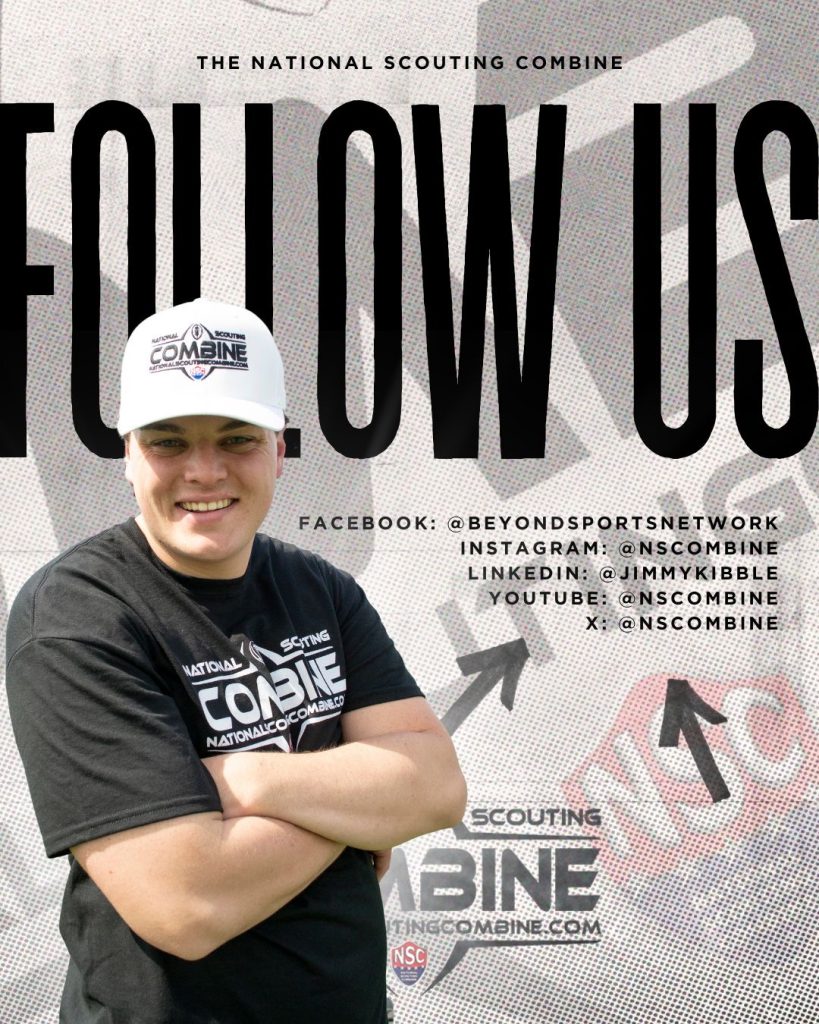

SCAM ALERT
NSC Staff have recently been made aware of a SCAM by an individual representing himself to high school athletes as being a “Member of the
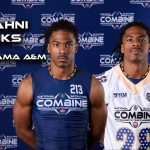
Football and Business: Amahni Spinks is a Creative Thinker On and Off the Field
Football and Business: Amahni Spinks is a Creative Thinker On and Off the Field
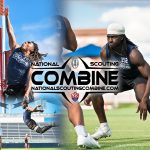
Top 25 Athletes Shine at the 2026 National Scouting Combine in Naples, Florida
Top 25 Athletes Shine at the 2026 National Scouting Combine in Naples, Florida The 2026 National Scouting Combine showcased elite athletic talent at the Paradise
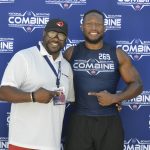
TopDraft Named as a NIL Education Partner of the National Scouting Combine
TopDraft Named as a NIL Education Partner of the National Scouting Combine The National Scouting Combine is proud to welcome TopDraft as a NIL Education
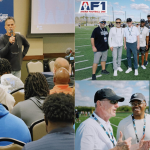
AF1 AT THE NATIONAL SCOUTING COMBINE IN NAPLES
AF1 AT THE NATIONAL SCOUTING COMBINE IN NAPLES
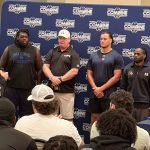
AF1 SIGNS SIX PLAYERS AFTER NSC PADDED PRACTICE WEDNESDAY
AF1 SIGNS SIX PLAYERS AFTER NSC PADDED PRACTICE WEDNESDAY By Gary Compton NAPLES, Fla. — The National Scouting Combine reached its most revealing phase Wednesday
